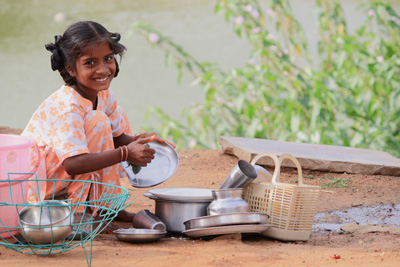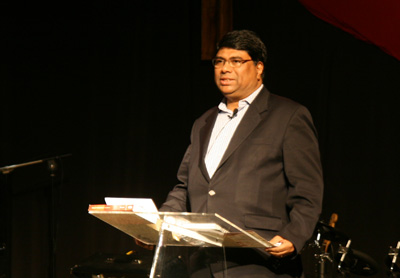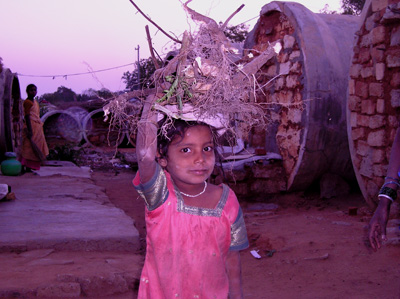
DAVID ADAMS speaks with Joseph D’souza, founder of the Dalit Freedom Network…
While millions who watched the Oscar-winning film Slumdog Millionaire found themselves deeply moved by the conditions in which children were living in the Bombay slums, what many still don’t know is that the children shown in the story carry an additional burden to their abject poverty.
They are Dalits, a group of people also known in India as the “untouchables”.
 |
|
SUPPORTING THE DALITS: Joseph D’souza talks about the Dalit Freedom Network during his recent trip to Australia. “They are untouchable, they are people without rights. Any assertion of rights, any assertion of human dignity gets a violent response and reaction.”– Dr Joseph D’souza, president of the Dalit Freedom Network. |
“They are not normal Indian children,” Joseph D’souza, the international president of the Dalit Freedom Network, said while in Australia recently. “Those children out of Slumdog Millionaire are all Dalit Muslim kids. We work among them.”
The Dalits – the word Dalit literally means “oppressed” or “crushed” and carries connotations of being dehumanised – are considered outcasts within Indian society which, for the past 3000 years, has recognised four main castes.
While the lowest caste of the four castes – the ‘Sudra’ caste – has less rights and privileges than higher castes, ‘outcast’ groups such as the Dalits and tribal people – who number some 250 million people and account for 25 per cent of the Indian population – have no rights.
“They are untouchable, they are people without rights,” says Dr D’souza, who recently spent a couple of weeks in Australia, visiting Sydney, Canberra and Geelong in a trip organised by mission organisation OM (Operation Mobilisation), of which Mr D’souza is an international vice-president.
“Any assertion of rights, any assertion of human dignity gets a violent response and reaction.”
Dr D’souza’s book, Dalit Freedom, quotes Human Rights Watch data which shows there were more than 98,000 cases of attacks on “scheduled castes” – a Government term used to refer to Dalits – between 1994 and 1996, and suggests that given the reluctance of Dalits to report crimes, the actual number is much higher.
While noting the figures are some 10 years old, the book states that the “atrocities” committed against Dalits are rising in both frequency and intensity – Dr D’souza says that there is a crime committed against a Dalit every 18 minutes in India.
“These are attacks that are carried out with impunity because they are not brought to book,” he says, noting that less than two per cent of all atrocities committed against Dalits ever reach conviction. “So it’s free game for everybody.”
Crimes committed against Dalits include human trafficking, beatings, rape, and even murder.
Dr D’souza, who is also president of the All India Church Council, describes the caste system as “one of the curses of modern India”.
“We are such a caste-divided society 60 years after independence – and such a caste-run society, it’s unbelievable,” he says. “It affects everything…your identity, your social interaction, it impacts the person whom you marry, in many cases, it impacts the profession you are going to do. (And) unfortunately the Dalits are the ones who bear the brunt of caste oppression and discrimination.”
Dr D’souza says the caste system has been challenged several times over the past 3000 years including by Dr B.R. Ambedkar, a contemporary of Gandhi, who fought for the abolition of the caste system.
“He’s the one who in 1936/37 coined the slogan, ‘I was born a Hindu but I will not die a Hindu’,” Dr D’souza says. “And that had reverberated right across India to today.”
While Dr Ambedkar and those who fought with him were able to introduce some affirmative action benefits for the Dalits which opened a window of economic and social development which a minority of Dalits have been able to use, Dr D’souza says that these steps forwards have only profited a minority of Dalits.
“The majority continue to struggle because the system ensures they’re still excluded,” he says. “It’s not the laws of India that are found wanting; it’s the implementation of the law, it’s the carrying out of the law because while the law outlaws the practice of untouchability, society had not outlawed the caste system. So culturally we operate with the caste system and legally we say we don’t believe in the practice of ‘untouchability’.”
The most recent challenge to the caste system came in the late 1990s and it was out of that movement that the Dalit Freedom Network was created in 2002, first in the US and later in Canada and the UK. Now in many countries around the world, it is being launched in Australia this year.
The network was formed with the aim of working for the social, economic, health and spiritual rights of the Dalits and the low castes and in involved in advocating on their behalf among governments in India and around the world as well as through international fora and among the corporate world.
|
|
|
FIGHTING FOR A FUTURE: The Dalit Freedom Network and its partners in India have so far built 90 ‘Dalit Education Centres’ across the country which are teaching more than 18,000 children. |
Dr D’souza’s heart for the Dalits was partly forged out of his own experiences. Growing in a Christian home living in what he describes as “Christian ghettos” among low caste and Dalit people, he says his childhood helped to provide a “window in their world”.
“That’s a significant part of my upbringing,” he notes, adding that his views of Dalits were further shaped when he met his future wife Mariam and they decided to get married.
“I was from an upper caste background while she was from one of the ‘Adivasis’, criminal tribe groups, so that introduced me to the real life…We never thought much about it but some of our family members were opposed to it, some of our friends were opposed to it.”
He says his heart for the Dalits was further shaped by attacks on Christians which commenced in the mid-1990s and included the martyrdom of Australian missionary Graham Staines and his two young sons, who were burnt to death in their car in Orissa in 1999.
“All of that has continued and we have found that in this last 15 years of attacks against Christians, the primary targets of the attacks of these right-wing Hindu fundamentalists is always the Dalit Christians. Ninety per cent and more of all of these attacks are basically directed against them.”
While the number of Dalit Christians isn’t known – around 2.5 per cent of India’s population is officially Christian – Dr D’souza says it is generally well known that there is a significant number of Dalits who are deserting the caste system and finding “dignity and meaning through the powerful life and sacrifice of Jesus’ death”.
Dr D’souza says that for him, one of the biggest tragedies of the Dalits, lies in their lack of spiritual rights under the caste system which prohibits them from entering the main temples, from hearing the scriptures or from becoming priests and condemns their food culture – which includes beef – as unholy.
“There is a systematic assault on their whole life…” Dr D’souza says. “It’s one thing to take away their human dignity, take away their social dignity, rape and abuse them, but then to take away their spiritual rights…”
He says that as a result when the Dalits hear about Christ and faith systems that offer them all spiritual rights, “it’s almost like somebody has dropped nuclear power in their midst”.
Dr D’souza says that while the church in India continues to battle against the caste system within its own walls, “the other side of the story is that significant numbers of Dalit people who have turned to Christ, today they are pastors, they are bishops, they are in the highest spiritual functions. And those examples are powerful symbols of change and what’s possible.”
Dr D’souza says that a key to freeing the Dalits involves “breaking the cycle of mental slavery”.
“Because once you are born into a Dalit family, the family itself reinforces the caste degradation because the family is worried that a child will not know the rules and get harmed and killed or burned to death or maimed for life,” he says. “And then when the child grows up and goes into the world, the upper caste reinforce that, the school system reinforces that. So by the time the child is 10, 12 or 13, it is over and they are permanently marred as slaves.
“So the way to change this is to bring up a whole new generation of Dalit children who think of themselves as being made, like everyone else, in the image of God, and because of that, believe in their full human dignity…And if that education is also given in what we all know is the language of governance and economics and business in India – which is English – you really are giving them a tool to break out of their slavery.”
To that end, the Dalit Freedom Network and its partners in India have so far built 90 ‘Dalit Education Centres’ across the country which are teaching more than 18,000 children, who are sponsored to attend instead of a government school. The centres – which it is eventually hoped will number 1,000 – saw their first graduates – 38 students, aged about 16 or 17, from communities across the country – earlier this year.
Mr D’souza says the centres are not just about freeing one generation. “It is a slow program but it is a program that is got a long view of how this can be changed. And for us this is key for social reformation in India.”
The Dalit Freedom Network is also involved in providing micro-finance to Dalit women – “who are twice oppressed,” notes Dr D’souza – in a bid to help free them from the bonded slavery in which many live. It also helps to provide funding for them to send their children to school.
“Empowering of the men and freeing of the women is a very important part of the agenda,” notes Dr D’souza. “All of it is centred around the school.”
The network is also involved in providing preventative healthcare through education and training.
Dr D’souza is optimistic that the Dalits can be freed within the current generation. The challenge for the church, he told an audience in Geelong, is for it to be at the forefront of what God is doing.
“My challenge to you tonight is, will you jump with the global church into the stream that has broken out in India,” he says. “I have no doubt…that what’s happening in India will impact every part of the world…This is of God…”
~ www.dalitfreedomnetwork.org
~ www.om.org.au







